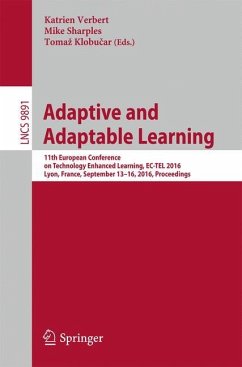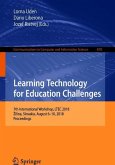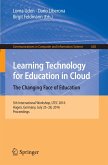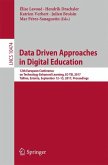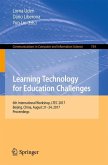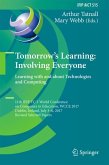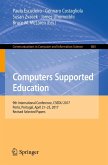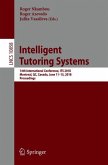Adaptive and Adaptable Learning
11th European Conference on Technology Enhanced Learning, EC-TEL 2016, Lyon, France, September 13-16, 2016, Proceedings
Herausgegeben:Verbert, Katrien; Sharples, Mike; Klobucar, Tomaz
Adaptive and Adaptable Learning
11th European Conference on Technology Enhanced Learning, EC-TEL 2016, Lyon, France, September 13-16, 2016, Proceedings
Herausgegeben:Verbert, Katrien; Sharples, Mike; Klobucar, Tomaz
- Broschiertes Buch
- Merkliste
- Auf die Merkliste
- Bewerten Bewerten
- Teilen
- Produkt teilen
- Produkterinnerung
- Produkterinnerung
This book constitutes the proceedings of the 11th European Conference on Technology Enhanced Learning, EC-TEL 2016, held in Lyon, France, in September 2016. The 26 full papers, 23 short papers, 8 demo papers, and 33 poster papers presented in this volume were carefully reviewed and selected from 148 submissions.
Andere Kunden interessierten sich auch für
![Learning Technology for Education Challenges Learning Technology for Education Challenges]() Learning Technology for Education Challenges38,99 €
Learning Technology for Education Challenges38,99 €![Learning Technology for Education in Cloud - The Changing Face of Education Learning Technology for Education in Cloud - The Changing Face of Education]() Learning Technology for Education in Cloud - The Changing Face of Education38,99 €
Learning Technology for Education in Cloud - The Changing Face of Education38,99 €![Data Driven Approaches in Digital Education Data Driven Approaches in Digital Education]() Data Driven Approaches in Digital Education39,99 €
Data Driven Approaches in Digital Education39,99 €![Learning Technology for Education Challenges Learning Technology for Education Challenges]() Learning Technology for Education Challenges38,99 €
Learning Technology for Education Challenges38,99 €![Tomorrow's Learning: Involving Everyone. Learning with and about Technologies and Computing Tomorrow's Learning: Involving Everyone. Learning with and about Technologies and Computing]() Tomorrow's Learning: Involving Everyone. Learning with and about Technologies and Computing76,99 €
Tomorrow's Learning: Involving Everyone. Learning with and about Technologies and Computing76,99 €![Computers Supported Education Computers Supported Education]() Computers Supported Education38,99 €
Computers Supported Education38,99 €![Intelligent Tutoring Systems Intelligent Tutoring Systems]() Intelligent Tutoring Systems38,99 €
Intelligent Tutoring Systems38,99 €-
-
-
This book constitutes the proceedings of the 11th European Conference on Technology Enhanced Learning, EC-TEL 2016, held in Lyon, France, in September 2016.
The 26 full papers, 23 short papers, 8 demo papers, and 33 poster papers presented in this volume were carefully reviewed and selected from 148 submissions.
The 26 full papers, 23 short papers, 8 demo papers, and 33 poster papers presented in this volume were carefully reviewed and selected from 148 submissions.
Produktdetails
- Produktdetails
- Lecture Notes in Computer Science 9891
- Verlag: Springer / Springer International Publishing / Springer, Berlin
- Artikelnr. des Verlages: 978-3-319-45152-7
- 1st ed. 2016
- Seitenzahl: 708
- Erscheinungstermin: 7. September 2016
- Englisch
- Abmessung: 235mm x 155mm x 38mm
- Gewicht: 1054g
- ISBN-13: 9783319451527
- ISBN-10: 3319451529
- Artikelnr.: 45455452
- Herstellerkennzeichnung Die Herstellerinformationen sind derzeit nicht verfügbar.
- Lecture Notes in Computer Science 9891
- Verlag: Springer / Springer International Publishing / Springer, Berlin
- Artikelnr. des Verlages: 978-3-319-45152-7
- 1st ed. 2016
- Seitenzahl: 708
- Erscheinungstermin: 7. September 2016
- Englisch
- Abmessung: 235mm x 155mm x 38mm
- Gewicht: 1054g
- ISBN-13: 9783319451527
- ISBN-10: 3319451529
- Artikelnr.: 45455452
- Herstellerkennzeichnung Die Herstellerinformationen sind derzeit nicht verfügbar.
Full Papers.- A semantic-driven model for ranking digital learning objects based on diversity in the user comments.- Social Facilitation due to online inter-classrooms Tournaments.- How to Attract Students' Visual Attention.- Creating Effective Learning Analytics Dashboards: Lessons Learnt.- Retrieval Practice and Study Planning in MOOCs: Exploring Classroom-Based Self-Regulated Learning Strategies at Scale.- "Keep your eyes on 'em all!": A mobile eye-tracking analysis of teachers' sensitivity to students.- Flipped Classroom Model: Effects on Performance, Attitudes and Perceptions in High School Algebra.- Argumentation Identification for Academic Support in Undergraduate Writings.- Mobile Grading Paper-based Programming Exams: Automatic Semantic Partial Credit Assignment Approach.- Which Algorithms Suit Which Learning Environments? A Comparative Study of Recommender Systems in TEL.- Discouraging Gaming the System through Interventions of an Animated Pedagogical Agent.- Multi-Device Territoriality to Support Collaborative Activities -Implementation and Findings from the e-learning Domain.- Refinement of a Q-matrix with an ensemble technique based on multi-label classification algorithms.- When teaching practices meet tablets' affordances. Insights on the materiality of learning.- A Peer Evaluation tool of Learning Designs.- Learning in the context of ManuSkills: Attracting Youth to Manufacturing through TEL.- Does taking a MOOC as a complement for remedial courses have an effect on my learning outcomes? A pilot study on calculus.- Are you ready to collaborate? An adaptive measurement of students arguing skills before expecting them to learn together.- Examining the effects of social media in co-located classrooms: A case study based on SpeakUp.- Enhancing public speaking skills- an evaluation of the Presentation Trainer in the wild.- How to quantify student's regularity? Nurturing communities of inquiry: A formative study of the DojoIBL platform.- Inferring student attention with ASQ.- Chronicle of a scenario graph: from expected to observed learning path.- Adaptive Testing using a General Diagnostic Model.- How Teachers Use Data to Help Students Learn: Contextual Inquiry for the Design Of a Dashboard.- Short Papers.- Assessing learner-constructed conceptual models and simulations of dynamic systems.- Learning Analytics pilot with COACH2 - Searching for effective mirroring.- Predicting Academic Performance Based on Students' Blog and Microblog Posts.- Take up my Tags: Exploring Benefits of Meaning Making in a Collaborative Learning Task at the Workplace.- Consistency verification of learner profiles in adaptive serious games.- MoodlePeers: Factors relevant in learning group formation for improved learning outcomes, satisfaction and commitment in E-learning scenarios using GroupAL.- Towards a capitalization of processes analyzing interaction traces.- Improving usage of learning designs by teachers: a set of concepts for well-defined problems resolution.- Immersion and Persistence: Improving Learners' Engagement in Authentic Learning Situations.- STI-DICO: a Web-Based ITS for Fostering Dictionary Skills and Knowledge.- PyramidApp: Scalable Method Enabling Collaboration in the Classroom.- From Idea to Reality: Extensive and Executable Modeling Language for Mobile Learning Games.- Combining adaptive learning with learning analytics: precedents and directions.- An Adaptive E-learning Strategy to Overcome the Inherent Difficulties of the Learning Content.- Evaluating the effectiveness of an affective tutoring agent in specialized education.- MOOC design workshop: educational innovation with empathy and intent.- OERauthors: Requirements for collaborative OER authoring tools in global settings.- Virtual Reality for Training Doctors to Break Bad News.- User Motivation & Technology Acceptance in Online Learning Environments.- Reflective learning at the workplace - The MIRROR design toolbox.- Toward a Play Management System for Play-Based Learning.- The Blockchain and Kudos: a Distributed System for Educational Record, Reputation and Reward.- Game-Based Training for Complex Multi-Institutional Exercises of Joint Forces.- Demo Papers.- DALITE: Asynchronous Peer Instruction for MOOCs.- Digital and Multisensory Storytelling: Narration with Smell, Taste and Touch.- A Platform for Social Microlearning.- A Framework to Enhance Adaptivity in Moodle.- Refugees Welcome: Supporting informal language learning and integration with a gamified mobile application.- DEDOS-Player: Educational activities for touch devices.- The Booth: bringing out the Super Hero in you.- DojoIBL: nurturing communities of inquiry.- Poster Papers.- Towards an Automated Assessment Support for Student Contributions on Multiple Platforms.- Experiments on Virtual Manipulation in Chemistry Education.- A Survey Study to Gather Requirements for Designing a Mobile Service to Enhance Learning from Cultural Heritage.- Inspiring the Instructional Design Process through Online Experience Sharing.- An approach to the TEL teaching of non-technical skills from the perspective of an ill-defined problem.- Towards a context-based approach assisting learning scenarios reuse.- Revealing Behaviour Pattern Differences in Collaborative Problem Solving.- DevOpsUse for Rapid Training of Agile Practices within Undergraduate and Startup Communities.- Towards an authoring tool to acquire knowledge to design ITSs teaching problem solving methods.- Kodr: A Customizable Learning Platform For Computer Science Education.- A Reflective Quiz in a Professional Qualification Program for Stroke Nurses: A Field Trial.- Helping Teachers to Help Students by using an Open Learner Model.- Personalized Rooms Based Recommendation as a Mean for Increasing Students' Activity.- Detecting and Supporting the Evolving Knowledge Interests of Lifelong Professionals.- Boosting Vocational Education and Training in Small Enterprises.- Supporting Teaching Teams in Personalizing MOOCs Course Paths.-Increasing pupils' motivation on elementary school with help of social networks and mobile technologies.- Understanding Collective Behavior of Learning Design Communities.- A Value Model for MOOCs.- Framework for Learner Assessment in Learning Games.- A Bayesian Network For The Cognitive Diagnosis Of Deductive Reasoning.- Finding the Needle in a Haystack: Who are the most Central Authors within a Domain?.- Bio-inspired Computational Algorithms in Educational and Serious Games.- Learning experiences using tablets with children and people with autism spectrum disorder.- Introducing the U.S. Cyberlearning Community.- Future Research Directions for Innovating Pedagogy.- Platform-oriented semantic description of a learning scenarios.- Model of articulation between elements of a pedagogical assistance.- Simulation-based CALL Teacher Training.- Adaptable learning and learning analytics: a case study in a programming course.- Recommending Physics Exercises in Moodle based on Hierarchical Competence Profiles.- Learning Analytics for a Puzzle Game to Discover the Puzzle-Solving Tactics of Players.- Recommending dimension weights and scale values in multi-rubric evaluations.
Full Papers.- A semantic-driven model for ranking digital learning objects based on diversity in the user comments.- Social Facilitation due to online inter-classrooms Tournaments.- How to Attract Students' Visual Attention.- Creating Effective Learning Analytics Dashboards: Lessons Learnt.- Retrieval Practice and Study Planning in MOOCs: Exploring Classroom-Based Self-Regulated Learning Strategies at Scale.- "Keep your eyes on 'em all!": A mobile eye-tracking analysis of teachers' sensitivity to students.- Flipped Classroom Model: Effects on Performance, Attitudes and Perceptions in High School Algebra.- Argumentation Identification for Academic Support in Undergraduate Writings.- Mobile Grading Paper-based Programming Exams: Automatic Semantic Partial Credit Assignment Approach.- Which Algorithms Suit Which Learning Environments? A Comparative Study of Recommender Systems in TEL.- Discouraging Gaming the System through Interventions of an Animated Pedagogical Agent.- Multi-Device Territoriality to Support Collaborative Activities -Implementation and Findings from the e-learning Domain.- Refinement of a Q-matrix with an ensemble technique based on multi-label classification algorithms.- When teaching practices meet tablets' affordances. Insights on the materiality of learning.- A Peer Evaluation tool of Learning Designs.- Learning in the context of ManuSkills: Attracting Youth to Manufacturing through TEL.- Does taking a MOOC as a complement for remedial courses have an effect on my learning outcomes? A pilot study on calculus.- Are you ready to collaborate? An adaptive measurement of students arguing skills before expecting them to learn together.- Examining the effects of social media in co-located classrooms: A case study based on SpeakUp.- Enhancing public speaking skills- an evaluation of the Presentation Trainer in the wild.- How to quantify student's regularity? Nurturing communities of inquiry: A formative study of the DojoIBL platform.- Inferring student attention with ASQ.- Chronicle of a scenario graph: from expected to observed learning path.- Adaptive Testing using a General Diagnostic Model.- How Teachers Use Data to Help Students Learn: Contextual Inquiry for the Design Of a Dashboard.- Short Papers.- Assessing learner-constructed conceptual models and simulations of dynamic systems.- Learning Analytics pilot with COACH2 - Searching for effective mirroring.- Predicting Academic Performance Based on Students' Blog and Microblog Posts.- Take up my Tags: Exploring Benefits of Meaning Making in a Collaborative Learning Task at the Workplace.- Consistency verification of learner profiles in adaptive serious games.- MoodlePeers: Factors relevant in learning group formation for improved learning outcomes, satisfaction and commitment in E-learning scenarios using GroupAL.- Towards a capitalization of processes analyzing interaction traces.- Improving usage of learning designs by teachers: a set of concepts for well-defined problems resolution.- Immersion and Persistence: Improving Learners' Engagement in Authentic Learning Situations.- STI-DICO: a Web-Based ITS for Fostering Dictionary Skills and Knowledge.- PyramidApp: Scalable Method Enabling Collaboration in the Classroom.- From Idea to Reality: Extensive and Executable Modeling Language for Mobile Learning Games.- Combining adaptive learning with learning analytics: precedents and directions.- An Adaptive E-learning Strategy to Overcome the Inherent Difficulties of the Learning Content.- Evaluating the effectiveness of an affective tutoring agent in specialized education.- MOOC design workshop: educational innovation with empathy and intent.- OERauthors: Requirements for collaborative OER authoring tools in global settings.- Virtual Reality for Training Doctors to Break Bad News.- User Motivation & Technology Acceptance in Online Learning Environments.- Reflective learning at the workplace - The MIRROR design toolbox.- Toward a Play Management System for Play-Based Learning.- The Blockchain and Kudos: a Distributed System for Educational Record, Reputation and Reward.- Game-Based Training for Complex Multi-Institutional Exercises of Joint Forces.- Demo Papers.- DALITE: Asynchronous Peer Instruction for MOOCs.- Digital and Multisensory Storytelling: Narration with Smell, Taste and Touch.- A Platform for Social Microlearning.- A Framework to Enhance Adaptivity in Moodle.- Refugees Welcome: Supporting informal language learning and integration with a gamified mobile application.- DEDOS-Player: Educational activities for touch devices.- The Booth: bringing out the Super Hero in you.- DojoIBL: nurturing communities of inquiry.- Poster Papers.- Towards an Automated Assessment Support for Student Contributions on Multiple Platforms.- Experiments on Virtual Manipulation in Chemistry Education.- A Survey Study to Gather Requirements for Designing a Mobile Service to Enhance Learning from Cultural Heritage.- Inspiring the Instructional Design Process through Online Experience Sharing.- An approach to the TEL teaching of non-technical skills from the perspective of an ill-defined problem.- Towards a context-based approach assisting learning scenarios reuse.- Revealing Behaviour Pattern Differences in Collaborative Problem Solving.- DevOpsUse for Rapid Training of Agile Practices within Undergraduate and Startup Communities.- Towards an authoring tool to acquire knowledge to design ITSs teaching problem solving methods.- Kodr: A Customizable Learning Platform For Computer Science Education.- A Reflective Quiz in a Professional Qualification Program for Stroke Nurses: A Field Trial.- Helping Teachers to Help Students by using an Open Learner Model.- Personalized Rooms Based Recommendation as a Mean for Increasing Students' Activity.- Detecting and Supporting the Evolving Knowledge Interests of Lifelong Professionals.- Boosting Vocational Education and Training in Small Enterprises.- Supporting Teaching Teams in Personalizing MOOCs Course Paths.-Increasing pupils' motivation on elementary school with help of social networks and mobile technologies.- Understanding Collective Behavior of Learning Design Communities.- A Value Model for MOOCs.- Framework for Learner Assessment in Learning Games.- A Bayesian Network For The Cognitive Diagnosis Of Deductive Reasoning.- Finding the Needle in a Haystack: Who are the most Central Authors within a Domain?.- Bio-inspired Computational Algorithms in Educational and Serious Games.- Learning experiences using tablets with children and people with autism spectrum disorder.- Introducing the U.S. Cyberlearning Community.- Future Research Directions for Innovating Pedagogy.- Platform-oriented semantic description of a learning scenarios.- Model of articulation between elements of a pedagogical assistance.- Simulation-based CALL Teacher Training.- Adaptable learning and learning analytics: a case study in a programming course.- Recommending Physics Exercises in Moodle based on Hierarchical Competence Profiles.- Learning Analytics for a Puzzle Game to Discover the Puzzle-Solving Tactics of Players.- Recommending dimension weights and scale values in multi-rubric evaluations.

